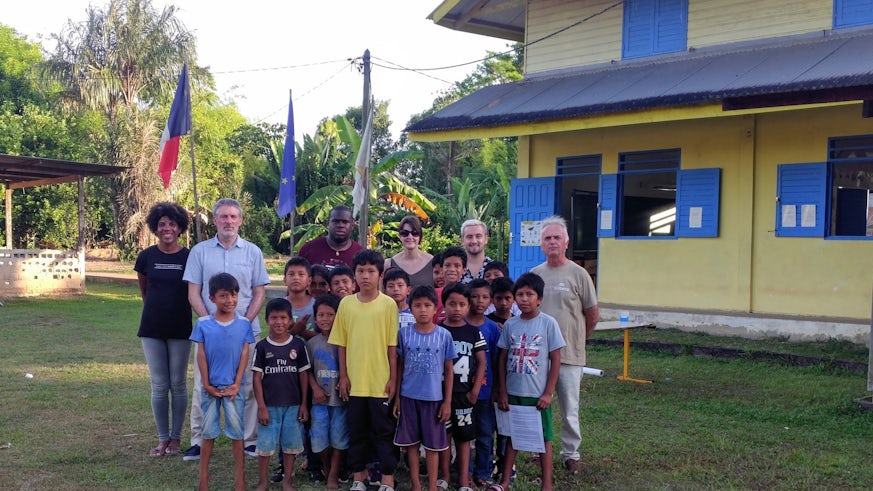CITER members visit French Guiana
8 November 2017

During October Helen Brown a research associate from the school of Dentistry, and Mike Pascoe, a PhD student from the school of Pharmacy and Pharmaceutical Science, travelled to French Guiana to participate in a week long science led outreach programme.
The programme "Science in Schools" was a collaboration between the British Council and French Ministry of Education which was aimed to bring interactive science learning to the students living in the region, As the lessons were delivered in English, this in turn helped the children learn fundamental scientific conceprts whilst practising their language skills with STEM professionals.
In each session three activities were delivered which covered the fundamentals of microbiology. The first activity consisted of taking swabs from various sources to see how prevalent microbe are. The children were particularly excited when they discovered they could test which toilets were dirtier: the girls or the boys! The second used Giant Microbes to introduce pupils to some of the most common disease-causing microbes in humans as well as some which comprise our microbiome and contribute to health. The final activity was Blast-a-Biofilm which is part of the CITER outreach programme. Using water pistols and hair gel (it could get a bit messy), this activity introduced the students to the concept of biofilms using the every day example of dental plaque and helped them to understand the role brushing teeth plays in preventing cavities
The students also held a master class with trainee teachers at the Université de Guyane in order to demonstrate to them ways in which they can incorporate interactive learning methods into their own lesson plans.


Over the course of the week, the students travelled to five major areas of French Guiana, including Maripasoula, Cacao, Kourou, Cayenne and Saint-Georges-de-l’Oyapock. The communities in each of these areas had a distinct background including Creole, Hmong, Metropolitan French & Native peoples and demonstrated that French Guianan society was a true cultural mosaic. Reaching these isolated and economically deprived areas also required unusual transport arrangements. Maripasoula was an hours flight over the Amazon in a very small plane whilst the village of Trois Palétuviers was reachable only by catching a 45 minute ride downstream of Saint-Georges in a pirogue.

Although the students have previously engaged in outreach in the UK, Helen Brown commented "participating in the "Science in Schools" programme was a uniquely challenging experience...however the satisfaction we both felt from teaching these children certainly made the experience one we will treasure and remember fondly for the rest of our lives". . As many of the students had limited English skills, the students had to carefully consider the key messages they wanted to convey and how to do that in the most simple terms.
Helen and Mike would like to thank the British Council for arranging their participation in the "Science in Schools" programme and funding the trip, the Microbiology Society for awarding the outreach grant to purchase many of the learning materials and to CITER for providing the cloth activity poster and badges. Special thanks to all the pupils and teachers of the schools, especially the staff of Académie de Guyane for making them feel so welcome. If you are interested in finding out more about the British Councils "Science in Schools" programme please visit the website https://www.britishcouncil.fr/en/programmes/education/schools/science-schools